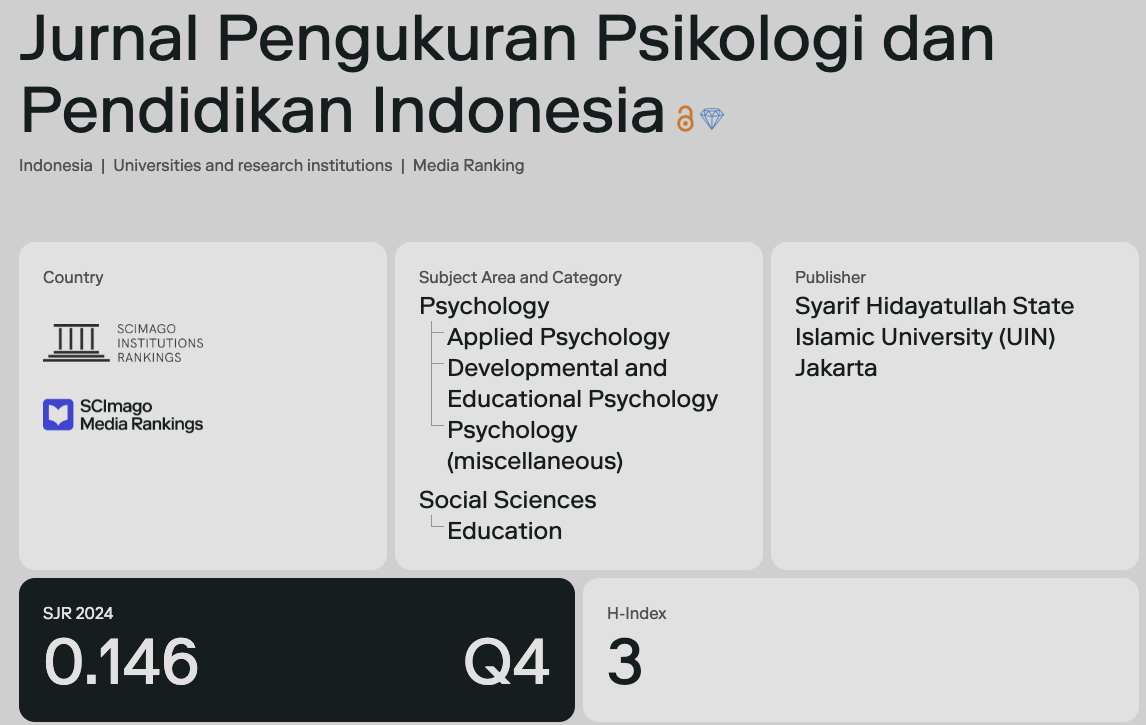Scale Construction of The Discipline Scale For Indonesian Air Force (TNI Angkatan Udara) Military Personnel (IMPI-D32)
DOI:
https://doi.org/10.15408/jp3i.v11i1.19478Keywords:
discipline, Indonesian Air Force, scale construction, psychometricAbstract
This study aims to create a discipline measuring tool with good psychometric properties for Indonesian Air Force Military Personnel (IMPI-D32). It was conducted using an integration of self-discipline, motivation to obey, and discipline theories in a military context. The IMPI-D32 consists of 32 items and its construction are based on the Classical Theory Test. The item's content validity was estimated using the Aiken V index at a minimum of .690. Furthermore, the item discriminations showed that the corrected item-total correlation for all items is above .3. Meanwhile, the reliability estimation with the Spearman-Brown formula indicated a satisfactory coefficient value of .916. The standard error of measuring the IMPI-D32 was 3.439 with the confidence of true score interval between X-6 to X+6.
References
Aiken, L. R. (1985). Three coefficients for analyzing the reliability and validity of ratings. Educational and Psychological Measurement, 45, 131–142.
Anastasi, A. (1976). Psychological Testing (4th ed.). New York, NY, US: Macmillan Publishing.
Azwar, S. (2012). Reliabilitas dan validitas (Ed. 4). Yogyakarta: Pustaka Pelajar.
Azwar, S. (2017). Penyusunan skala psikologi. Yogyakarta: Pustaka Pelajar.
Cohen, R. J., & Swerdlikl, M. E. (2013). Psychological Testing and Assessment: An Introduction to Tests and Measurement (7th ed.). New York, NY, US: McGraw-Hill.
Duckworth, A. L., & Kern, M. L. (2011). A meta-analysis of the convergent validity of self-control measures. Journal of Research in Personality, 45, 259–268. https://doi.org/10.1016/j.jrp.2011.02.004
Duckworth, A. L., & Seligman, M. E. P. (2006). Self-discipline gives girls the edge : Gender in self-discipline , grades , and achievement test scores. Journal of Educational Psychology. 98(1), 198–208. https://doi.org/10.1037/0022-0663.98.1.198
Guilford, J. (1956). Fundamental statistics in psychology and education (3 ed.). New York, NY: McGraww Hill.
Hartmann, E., Sunde, T., Kristensen, W., & Martinussen, M. (2003). Psychological measures as predictors of military training performance. Journal of Personality Assessment, 80(1), 87–98. https://doi.org/10.1207/S15327752JPA8001_17
Hurlock, Elizabeth B. (1993). Psikologi Perkembangan: Suatu pendekatan sepanjang rentang kehidupan (edisi kelima). Jakarta: Erlangga.
McGrew, K., LaForte, E., & Schrank, F. (1994). Woodcock-Johnson IV technical manual. Riverside: The Riverside Publishing Company.
Mayer, J. D., Panter, A. T., & Caruso, D. R. (2017). A closer look at the Test of Personal Intelligence (TOPI). Personality and Individual Differences, 111, 301–311. https://doi.org/10.1016/j.paid.2017.02.008
Mihai, S. C., Corneliu, M., & Sandina, I. (2014). Dimensions of the personality of the military students from Land Forces Academy of Sibiu: A psychometric approach. Procedia-Social and Behavioral Sciences, 127, 479–483. https://doi.org/10.1016/j.sbspro.2014.03.294
Netemeyer, R. G., Bearden, W. O., & Sharma, S. (2003). Scaling Procedures: Issues and Applications. Thousand Oaks, Callifornia: Sage Publication, Inc.
Spector, B. I. (1978). Military self-discipline: A motivational Analysis. Arlington, Virginia.
Taylor, A. F., Kuo, F. E., & Sullivan, W. C. (2002). Views of nature and self-discipline: Evidence from inner city children. Journal of Environmental Psychology, 22, 49–63. https://doi.org/10.1006/jevp.2001.0241
Thorndike, R. M. (1997). The early history of intelligence testing. In Contemporary intellectual assessment: Theories, tests, and issues. (pp. 3–16). New York, NY, US: Guilford Press.
Zimmerman, B. J., & Kitsantas, A. (2014). Comparing students ’ self-discipline and self-regulation measures and their prediction of academic achievement. Contemporary Educational Psychology. 39, 145–155.








